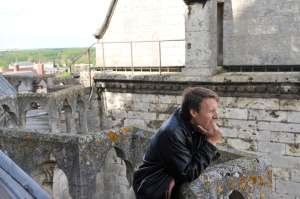I was a broken person.
At age 36, I already felt like a failure. I had accomplished a lot by earning multiple graduate degrees, taking important roles of responsibility as a pastor, and impressing others in various ways. I had an amazing wife and two beautiful children. But in my heart of hearts, my achievements meant little to me. I didn’t feel very valuable as a person. Instead, I kept thinking about being unemployed. Worse, I was plagued by shame over how far short my life fell from what I wanted it to be—and from what I believed God wanted it to be. Not only was I keenly aware of all the “bad” things I had done in my life; I felt like I, myself, was “bad”.
By the grace of God, I was given an opportunity to attend a seminar on the subject of breaking the silence of shame. I learned that what was going on inside of me was far more serious than I had realized. Feeling guilty about our sins and failures from time to time is normal and healthy, and can even motivate us to make needed changes in our lives. What I was feeling was something insidious. I felt ashamed of myself at the core of my being, and when unhealed shame remains in the soil of our hearts, it becomes toxic.
Such shame often produces “weeds,” easily recognizable as products of feeling so poorly about ourselves. For example, our lives may be marked by persistently negative attitudes, highly visible sins, or other self-defeating, destructive behavior. Surprisingly, though, toxic shame can also produce seemingly “good fruit.”
Sometimes, when we believe that we are bad or fundamentally flawed, we try to “fix” ourselves by whatever means possible. We may even succeed at accomplishing much or creating something beautiful. We may hold a highly responsible position. We may serve others regularly and give generously. Perhaps we go to great lengths to make ourselves physically attractive, or to develop extraordinary skills. To us and everyone around us, our lives may appear to be very successful and fruitful.
However, when our efforts are driven by toxic shame (i.e., desperate attempts to do something in order to feel good about ourselves) and not by the Spirit of God, all our striving will ultimately be unsatisfying. At some point, we may give up out of frustration or discouragement. We may keep pushing and driving ourselves to exhaustion. Or, in spite of convincing everyone else that we are truly extraordinary individuals, we still fail to convince ourselves.
When I heard this teaching, the message pierced my heart. I realized that I could never do enough to truly feel good about myself. I am not ever going to find the solution to toxic shame in my own accomplishments. Instead of putting my trust in what I could do for myself, I needed to trust in God’s love and acceptance of me, despite all my shortcomings.
The image of my holding my firstborn son suddenly flashed through my mind. We were in the hospital, the day he was born. My heart was full, and words gushed out of my mouth that I didn’t anticipate. I looked at him tenderly and said, “Son, there is nothing you could ever do that would make me not love you.” As I basked in the warmth of that precious memory, the same kind of love I felt for my son began flowing within me, filling the lonely, raw, frightened, and empty spaces that were etched as scars throughout my soul.
Our Creator loves us simply because we are his children. He sees all our faults and limitations, and He still loves and accepts us. We belong to Him. And, yes, our moral failures and resistance to God create serious problems that can hurt our relationship with God. Yet, God’s love is so great that He not only reaches out to us with loving acceptance, he also graciously provides a solution for our sin that we could not produce on our own.
With new joy, I recalled the words of the Apostle Paul on this very subject. He explained to the Roman Christians that God’s love precedes all of our attempts to establish our own worthiness. What Jesus did by giving his life for us on the cross shows us how far God will go to to keep us safely in His care forever. Paul wrote, “But God demonstrates his own love for us in this: While we were still sinners (i.e. before we even showed any interest in knowing, loving, or serving God), Christ died for us.” (2)
In that wonderful moment of awakening, my brokenness was healed. My eyes were opened. My heart was touched. I could hold my head high once again. God’s extraordinary love and grace had replaced shame in the soil of my soul. I now had a healthy, life-giving source of strength for my life—firmly rooted in God’s view of me, and not in my view of myself, or in my ability to earn or prove my worthiness. I was given a solid foundation of love to stand upon that does not crumble every time I stumble, or whenever I fall short of my ideals, fail, or feel rejected.
Several years later, someone who knew me well, asked me, “Who are you? “I hesitated for a moment, surprised by the unexpected question. But suddenly, I knew my answer.
Who am I? I am loved.
Author’s notes:
(1) Today’s post is a revised, English version of my recent post in French, “Je suis aimé!” (April 20, 2015). The original text was in French, because I shared this brief testimony with the spiritual pilgrims at the annual Cathedral Retreat, conducted in collaboration with the Chemin Neuf Community in Chartres, France, on April 19, 2015. On May 3, an earlier English version was published on The Full Light website, which offers hope and healing words for those suffering from abuse of various kinds, under the same title, “I am loved!“
(2) Romans 5: 8, NIV. I added the words in italics to clarify the meaning of the verse.
(3) Thank you to Jill Geoffrion for the photos above.







